
By Alec Scott, LLB 1994 / Photography by Blaise Hayward, Sven Boecker, Gerard Yunker and Sofia Kirk
From the Fall/Winter 2013 issue of Nexus.
For about two decades now, a few graduates of the Faculty of Law have taken jobs at major New York law firms. The huge firms are staffed by the smart and motivated; the salaries tend to be high, though, of course, it's a superlatively expensive city; and the scope of legal work on offer in one of the world's biggest financial centres is usually broad and international in scope. Some stay there, many come back to Canada. For all, the demanding New York City experience helps them clarify what they really want in life.
These powerhouse firms began to hire from the Faculty with some regularity after a few individuals, a handful of outliers, landed jobs down there in the '80s and impressed their colleagues and the partners. They worked (and billed) the many hours expected, they delivered the desired results. Dress them at Saks Fifth Avenue or Brooks Brothers, and you almost wouldn't know, but for the occasional “aboot”, that they weren't born and bred South of the 49th, that they weren't the product of the usual-suspect top tier American schools.
After a certain time at a firm, any firm, some soul searching usually comes – if I'm keeping up with my contemporaries, getting good performance reviews, do I want to go for partner, really go for it? Is the culture a fit for me, the work adequately engaging? A supplementary question presents itself here: Is New York—this pace, this type of work, the square footage I can afford here—is it all really for me? Some choose to stay, but others opt to join firms in Canada's growing, increasingly internationally oriented cities.
I interviewed a few Faculty of Law graduates who decided to take job offers in New York—and heard how they got there, what, briefly, they found. But then I also spoke to some who, having been there, done that, decided to return to Canada, a bit older, perhaps wiser.
* * * * *
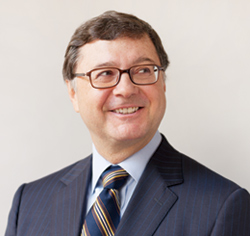
Donald Cranshaw '82
The view from a boardroom in an office tower at the tip of Manhattan: in the harbour, tugs tow barges towards the East River, a Circle Line cruiser pauses to give on-board tourists a photo-worthy view, and the plump Staten Island Ferry does one of its many daily crossings. Someone clears his throat behind me: Don Crawshaw, a partner with nearly three decades of experience at Sullivan & Cromwell LLP. This is one of several boardrooms on a floor of them at the Wall Street firm.
“That's the helicopter pad where Obama sometimes lands,” he says, pointing at a tarmac-covered dock protruding into the water. On the wall is a print of Manhattan when it was covered in forests, with some low-slung brick buildings at the edges.
Soft-spoken, wearing a suit with barely perceptible pinstripes, Crawshaw was one of the first University of Toronto law graduates to come down to New York, in the 1980s. In his day—he graduated with the Gold Medal in 1982—professors often encouraged students who'd excelled at the Faculty of Law to do an LLM abroad. Court clerkships were not the thing then, and the Hamilton native came to the firm after doing well at Columbia University.
“The firm had some history with Canada. Founding partner William Nelson Cromwell worked on the organization of the International Nickel Company in 1902, and the firm represented Inco for more than 100 years, helping to move its head office from New Jersey to Canada. But they probably didn't realize how tough it was going to be to sponsor me to get a green card. They had to advertise my position, something they'd never done before ... Nowadays, they're all old hands at bringing students in from Canada—and around the world.”
According to Crawshaw, the best you could say of the nearly bankrupt, crime-ridden New York of that period was that it had a “gritty glamour.” “Maybe people came for a weekend, but no one in their right mind would want to live here. A partner at a Toronto firm was trying to convince me to work in Toronto, and one of his big selling points was that I could live in Toronto, that I wouldn't have to live in place like New York.”
But New York's cultural riches and the opportunity to join one of the world's top securities shops drew Crawshaw. “What I love is new product development, and we've been involved in coming up with new legal tools to meet the market's changing needs.” In his quiet, utterly understated way, he's something of an advertisement for this life's possibilities. Not only is he among the world's top securities lawyers, but he's just completed an MA at a seminary with a major in biblical studies, and is an opera fan who periodically attends productions of Wagner's Ring around the world. A baritone, Crawshaw has sung in a number of choral societies and fondly recalls singing the role of the king of Bali Hai in “South Pacific Rim,” a musical (premiered at a firm holiday party) about the firm’s Australasian strategy.
I interview three young members of his firm's team. Crawshaw has been responsible for bringing a generation of law students down here.
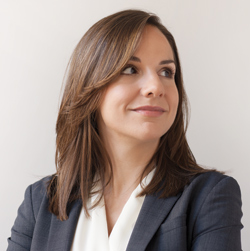
Sarah Crowder '10
Montrealer Sarah Crowder, JD 2010, specializes in white-collar criminal defense and investigations. She got her first taste of litigation at Downtown Legal Services, where she worked full-time in the summer after her first year at the Faculty. "As students, under a lawyer’s supervision, we could represent people on lesser criminal charges, ones where the clients faced a very low risk of jail time. But a client assigned to me had other charges pending, and did end up spending time in jail. Handling situations where you feel out of your depth is a key lawyer skill, right?"
She landed the New York job after clerking for Mr. Justice Morris Fish at the Supreme Court of Canada, and says she particularly enjoys the investigations work. "It's not a practice area I knew existed at law school and it can involve piecing together a story like a private investigator, through interviews and reviewing emails. It’s also very international in nature, which presents some interesting legal and tactical issues.” The hours tend to be long, but she begins most days briefly enjoying the view of the Empire State Building that greets her when she leaves her West Chelsea apartment. All in all, her mother isn’t surprised she ended up in New York. “I don’t remember this but she says when I came back from a high-school field trip, I said, ‘That city is made for me.’”
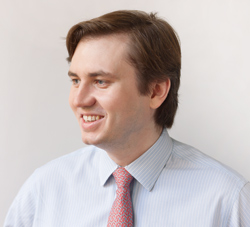
Julian Wright '08
Mergers and acquisitions lawyer Julian Wright, JD 2008, is another former Supreme Court clerk. He assisted Madam Justice Rosalie Abella, JD 1970. The Ottawa native, a diplomat's son who grew up in a number of European countries, says one of his work highlights to date has been junioring on the much-reported-on corporate rearrangement of film house The Weinstein Company. “Those core courses at law school remain helpful,” he says. “There's a steep learning curve for everyone starting to practice. But we are as well prepared as anyone else.”
A fresh addition to the U of T cadre at the firm, Amma Anaman, Class of 2012, arrived here in the fall of 2012, just in time for Hurricane Sandy. “I hadn't laid in supplies, so it was peanut butter and rice cakes for me.” She lives not far from the office, in lower Manhattan. When the power remained off, she decided to fly back to her native Saskatchewan to work remotely. A joint JD/MBA graduate of U of T, she's been interested in the stock market since she was a little girl—“my dentist father bought me and my brother Disney stock and we followed it”—and delights in seeing Wall Street's inner workings, trying to master the legal aspects of the deals that have been hived off to her by more senior associates.
The big New York firms have a strong commitment to pro-bono work, and Anaman is one of the many U of T grads down here to speak of the for-free representation her firm encourages her to do. “I thought it might just be window-dressing but it isn't. It really isn't.” Crowder is representing a claimant in a political asylum case, while Anaman, just got to use her knowledge of the law of piracy (absorbed while writing a paper at U of T) to help a Washington-based NGO pull together a legally tight position paper for a UN working group on the subject. “I certainly never thought I'd use that again.”
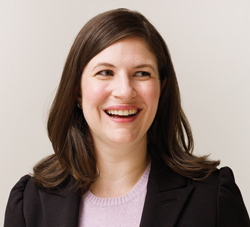
Claire Hunter '03
Claire Hunter, Class of 2003, is another former Supreme Court clerk, for Mr. Justice Frank Iacobucci, a former Faculty of Law dean. She also practiced litigation and criminal defense at Sullivan & Cromwell. The first time she ever got on her feet in court was in a pro bono case, she recalls, where a West African was seeking asylum, fearing genital mutiliation if she were sent back to her home country. After five and a half years, Hunter decided to return to her hometown of Vancouver, to join Hunter Litigation Chambers, a 22-lawyer shop. (Her father, John Hunter Q.C. is the Hunter on the letterhead, and her mother, Rebecca Hunter, is a senior lawyer at the Department of Justice. Sidebar: both were members of the storied Class of 1975, and met while studying at law school.)
The daughter compares her New York practice with her current one: “It's many of the same legal issues, but a different mix of clients here.” She mentions, by way of examples, recent appearances in an arbitration for a mining company and representing the provincial Chicken Marketing Board in administration proceedings. “At the firm, it's nice knowing who's in the office, who's not, which you could never know at a big firm like S & C. And you have to be on when you're on here, but the office isn't still hopping by the middle of the evening.” But she admits, every so often, to missing the ability to finish a rough piece of work late at night, leave it for all-night support staff to polish up, and find a nearly-there version awaiting her the next day. She's kept up her commitment to pro bono work: in 2013 she received an award from BC's Access Pro Bono for her work on cases involving parental rights, housing and benefits for the disabled.
It can be difficult to pinpoint the reasons why we make big decisions, but she gamely tries: “You know, I was happy working in New York, but when I reached the decision point, I'd just been back home on a visit. You think: ‘I like my friends and family, why exactly am I not there?’ Also, I was surprised to find it mattered, more than I thought it would, to live in Canada.”
* * * * *
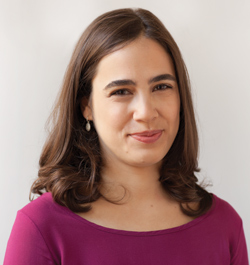
Cassandra Florio '10
On a break from my undergrad, I worked at Paul, Weiss, Rifkind, Wharton & Garrison LLP, interning on a big insider-trading case, and so it's something of a sentimental journey to visit Cassandra Florio, JD 2010, in the mid-town firm's offices. I tell her I remember once walking by partner John McEnroe Sr.'s office, and seeing “You-Cannot-Be-Serious” himself and his then-wife Tatum O'Neal sitting shoeless on his floor. “He still has an office, and comes in fairly often,” she says.
Florio, a corporate associate, says she ended up down here in part because a fellow Vancouver native, who also went to McGill for undergrad and to U of T for law, one year ahead of her, came down here. “Everyone jokes he's me plus one, and his office was next to mine – until he left to join Amazon.”
When we meet, Florio is living in nearby Hell's Kitchen, formerly as hellacious as its name suggest, gentrified relatively recently. “You know there are big rewards here but you have to be prepared for the work load, the sacrifices. If I'm out of here by eight or 10 at night that's good, but often it's later. Though these past few months have been good. I've had most of my weekends.”
A month after our initial interview, Florio accepted a job at the Vancouver office of Borden Ladner Gervais LLP, returning, like Hunter, to her picturesque home city. “It was a tough call,” she says. “I was not in a rush to leave Paul, Weiss. The work was interesting. But I was aware that the window of my portability was closing.” An unsentimental, in-the-present sort, she's not casting a lot of backward glances at the Big Apple. “I don't get misty-eyed about it. The pace was pretty incredible – it's like dog years, every year of experience there, you should multiply it. Your limits are tested, and you realize that you will have that capacity to turn it on if you need it.”
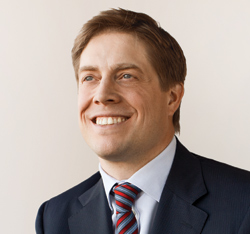
James McClary
Corporate lawyer James McClary also worked at Paul, Weiss, in its New York and London offices, and recently moved back, with his family, to his native Calgary to join Bennett Jones. As with Hunter, he has a new type of client to get used to, the various players in the oil patch, but mainly merging and reorganizing companies is similar to what he did at his New York firm. A strong violinist and singer with a music degree, born into an artsy family, McClary says his parents were supportive of his decision to go to law school, but a bit surprised. “You need this fire to make it in music, and I felt I didn't have it,” he says. “But from the moment I started at law school, it felt natural, much more interesting to me, more engaging than I thought.”
He loved the work at Paul, Weiss, but found it consuming. “I had to skip our first anniversary dinner; we shared a glass of wine on the roof at one a.m. And that wasn't that unusual. When we moved back to New York from London, I got a call in the airport. They needed me to come in the next day, rather than helping find and settle my family in a place.”
During the stint in England, he realized, if they stayed there, his son would grow up playing sports that he couldn't teach him – cricket and rugby. On a ski-trip back near Calgary, he and his wife made the decision. “But I'll never forget coming for my first interview in New York, through the hall in Grand Central Station, the huge skyscrapers... .”
* * * * *
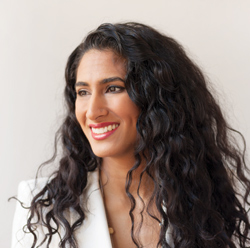
Mira Dewji '09
The few days I spend in New York, fierce rains buffet the city. I look progressively more bedraggled as I shuttle from one meeting to the next. There's some rainwater dripping down my face, and Mira Dewji, Class of 2009, kindly offers me a napkin to wipe it off, in a cafe at the base of her firm's building. The corporate associate's firm, Latham & Watkins, is located in a building commonly known as the Lipstick Building for its rounded edges, pink granite cladding, and taper towards the top. She confirms that a healthy work ethic is necessary to make it here. The Nolita (North of Little Italy) resident is a little less bullish on the city per se. “It can be a battle getting to and from work, and that sense of a social fabric like in Canada is not here.” She says as junior associate, “You have to learn how to find your balance, to learn how to sometimes say 'No, I'm maxed out right now.' Otherwise you'll be massacred.”
Another day, another boardroom, this one covered in photos by Patrick McMullan of the figures who bestrode New York in the gritty, glamorous '80s: the actor Christopher Walken, then young and rakish, and spike-haired pop artist Andy Warhol. “They were probably shot at Elaine's or Studio 54,” says Stuart Nayman, LLB 1991, a partner in Hand Baldachin & Amburgey LLP. “One of our partners knows McMullan, and the photographer's kindly loaned us some prints.” Nayman, a Montrealer, and his law partner Alan Baldachin, LLB 1993, both came down here to work at the old, storied Shearman & Sterling LLP firm in the '90s, and eventually decided boutique was more their speed.
“The great pleasure for me has generally been in helping small companies reach the next level,” says Nayman, who has helped put together IPOs for a long list of biotech and tech start-ups over his approximately two decades in practicing corporate law. “In a smaller firm, you can do this sort of work with greater efficiency.” In the past, Nayman's work required frequent travel—to Japan to pinpoint client Toyota's needs, and to Kazakhstan (“Before anyone knew where Kazakhstan was”) to help set up an oil-producing joint venture (“They're just starting to pump from the Caspian Sea now”). On top of the scope of the work, he likes two things about New York: “My wife is from here—and Bruce Springsteen plays way more concerts in this area whenever he does a tour.”
Nayman has watched the relationship between U of T and the big firms down here play out for some time, and turns reflective towards the end of our interview. “There was some concern at one point about U of T students coming down here—the brain drain. … It never became the case that all the top students ended up down here, just a few every year. And many of them go back, with that experience under their belts. For Canada to have some people here, for Canadian companies to be able to find lawyers down here who speak Canadian, that's not a negative.” He laughs at the inadvertent double negative.
“Some days, you're overwhelmed by the size of it,” he says, trying to sum up his New York experience. “But others, you feel somehow you've hit this hugely sweet spot. If you can keep your perspective … it can be a good place.”
* * * * *
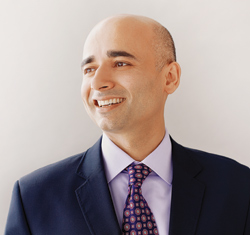
Kashif Zaman '00
Kashif Zaman is a transactional lawyer at Osler, Hoskin, Harcourt LLP, who began his post-law school career at Sullivan & Cromwell. “The first person I saw at the firm was Don Crawshaw,” he remembers. The experience in New York was what he expected: “The intensity, day after day, month after month. But three years in, I thought I wanted to find more balance. Also, the work was driving you towards specialization in New York.” He explains that certain lawyers develop a niche in, say, high yield bond offerings, and that becomes their life. “It's a deep market, there can be enough work for someone with a narrow expertise. Once you make that move, you're only going to do public M&A for the rest of your career, nothing else.”
He wanted a mix of transactional work and that's what he gets to do now, in one of Bay Street's top corporate law shops. “You're always learning in broad strokes, and when the next transaction is strikingly different from the last, it is a break of sorts.”
Since Zaman has worked in New York, students deciding whether to head there or stay in Toronto often ask him during the firm's recruitment drives about the differences between the two cities. He advises them that the New York firms are more highly leveraged, with a ratio of about 3.5 associates to every partner, as opposed to one to one, as is the case in many Toronto firms. “It's a volume business down there, you churn it out, and there's something of a revolving door at the firms – I started with 100 other associates, and 50 of them had left by the time I did.” But still when he enumerates what he liked about the work there's an obvious adrenaline in his voice. “But I advise them if they're leaning that way to try it for a couple of years. You need to see it, experience it, to learn from it, the sink-or-swim mentality, the high of the big transactions, the complexity of them. You get as much responsibility as you can take.”
Does he miss it? “Honestly, no, New York is great at marketing itself, and there is much to the hype. But the life I get here, with my family, that balance I mentioned. Toronto is more modest about itself, but it really has so much to offer, especially these days. In the end, it's more what I, what we wanted.”










